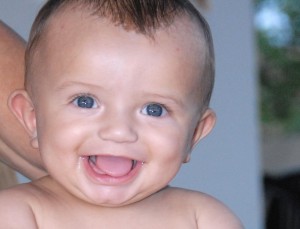A baby is the perfect dance partner to raise mutual consciousness. They begin life hyper-aware, hungry for learning, and often seem ecstatic or in rapture. Newborns are innately tuned in, investigating and deciphering complex changes in music and languages. They are curious, enthusiastic, and energetic. Their body begins to stir in response to stimuli and cues, and in kind their mind must begin to interpret sensations as it integrates them. Emotional intelligence develops in proportion to the accurate awareness of the meaning of our bodily feelings—this is known as “interoception”. Signals come from inner and outer bodily sensations. The system produces an individual brain map of experiences and interpretations.
A dynamic system of unconscious, primed, and conscious inclinations collectively influences behavior—it is our job to make the most adaptive choices with the information we have. For a baby, that is a sophisticated task. How do they do it? According to neuroscientists Brian Knutson and G. Elliot Wimmer part of the process is “reward processing”, which “represents an evolutionarily conserved, yet environmentally flexible phenomenon”. Psychology professor Alan Fogel, author of “Infancy: Infant, Family and Society” (now in its fifth printing) emphasizes that infant self-awareness is at first grounded in the body and its senses—it is “embodied”. He defines “embodied self awareness” as “the ability to pay attention to ourselves, to feel our sensations, emotions, and movements.” The other means toward awareness is “conceptual”, which allows for self-directed judgments, but may cause us to overlook awareness of body states. Depending on which mode of awareness you are operating from, different brain regions are activated. To be engaged in embodied self-awareness is essential for survival, and negates the possibility of conceptualizing at the same time. Philosopher Alva Noe argues that our nature is beyond the brain and intellect. We are “embodied” and “consciousness” is something we do as we attune to our surroundings.
A new study found that dancing with a caregiver in sync to music makes a baby more pro-social. This research was conducted at McMaster University, under the guidance of Dr. Laurel J. Trainor. 14-month old babies were placed in a front-facing carrier and then bounced by the researcher, either out of or in time with the musical beat. Afterwards, the researcher enacted hanging up laundry on a clothesline and then dropping a clothespin. The babies that were danced in sync to the music were more likely to pick up the pin and hand it to the adult. This study demonstrates that a baby is a self-directed agent in the socialization process.
The question arises: why did the babies bounced out of sync by the researcher choose not to be helpful? Studies have found newborns as young as 2 days old can decipher pitch, and that rocking to the beat is innate (István Winkler of the Hungarian Academy of Sciences). Trainor previously tested infants and found that if you dance a waltz rather than a jig, your baby will prefer the waltz. Since babies are born attuned to pitch, beat, rhythm, and movement, they are ready to coordinate their response to these impressions with others. The phenomenon triggers an emotional and physiological need for recognition or comprehension from the caregiver. Without contagious coordination of movement suggests a lack of congruent emotional states. Why bother helping someone who isn’t in sync with your positive feelings, goals, and intentions.
References:
Body Sense : Restorative Embodied Self-Awareness as a Pathway to Well-Being by Alan Fogelhttp://tinyurl.com/mesf9b
István Winklera, Gábor P. Hádena,c, Olivia Ladinigd, István Szillere and Henkjan Honingd (2009). Newborn infants detect the beat in music. Proceedings of the Natural Academy of Sciences of the United States of America, February 17, 2009 vol. 106 no. 7. http://www.pnas.org/content/106/7/2468.abstract
In Narvaez, D., Panksepp, J., Schore, A., & Gleason, T. (Eds.) (for 2012). Human Nature, Early Experience and the Environment of Evolutionary Adaptedness. New York: Oxford University Press.
University of Notre Dame (2013, January 7). Modern parenting may hinder brain development, research suggests. ScienceDaily.
Narvaez: http://www.psychologytoday.com/blog/moral-landscapes/201301/simple-ways-calm-crying-baby
